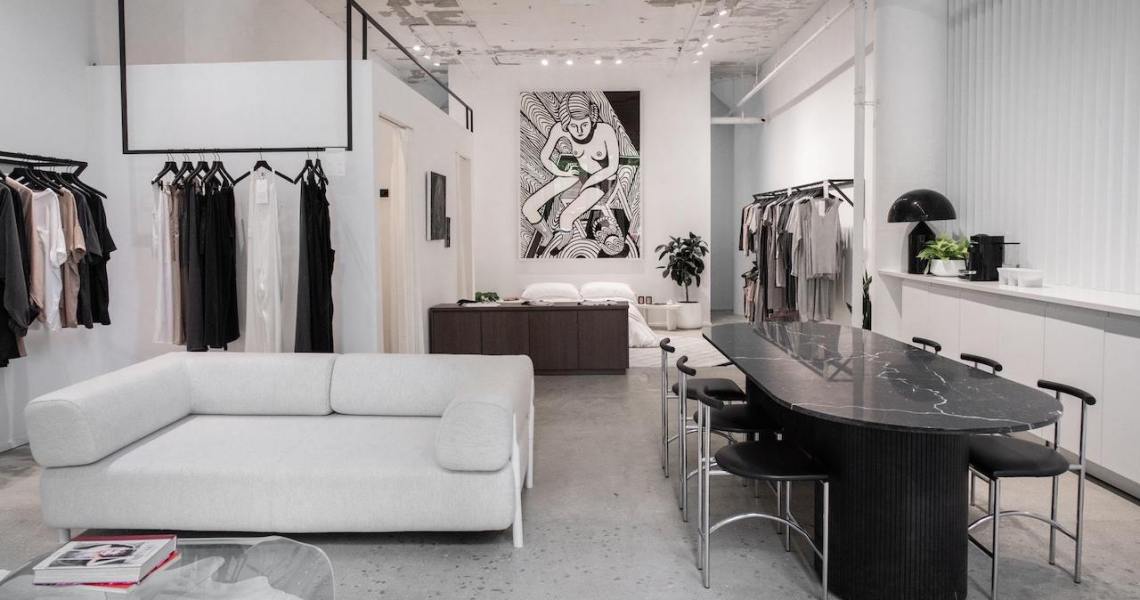Apparel brands are starting to figure out what guidelines to put in place ahead of reopening retail locations across the country over the next few weeks to months.
While most of the country remains on lockdown, some states are beginning to loosen restrictions and allow for more non-essential businesses — including fashion and apparel companies — to operate again. As of this week, Georgia, South Carolina and Tennessee are easing stay-at-home orders, while Texas is allowing retailers to sell via curbside pick-up. Most of the country has yet to see Phase 1 of reopening retail stores, but many brands are thinking through what policies and guidelines will need to be in place before the time comes. Among considerations are providing masks for associates and shoppers, taking the temperature of anyone who wants to enter the space, and reconfiguring the store layout to make social distancing easier in-store.
“If [stores in the U.S.] don’t reopen retail with a sound strategy and we encounter another wave of infection because of that, we are going to shut down for a long time,” said Mark Burstein, president of software company NGC.
On Friday, Kendra Scott is turning on curbside pick-up for 21 of its 23 Texas-based store locations after shutting all 108 of its stores in mid-March. The brand has been working toward converting all of its retail stores into mini fulfillment centers, and Kendra Scott president Tom Nolan said, “Curbside will be paramount to our success.”
With curbside being a big focus in states like Texas, it’s likely that retailers across the country will focus their energy on similar services, like buy-online, pick-up in store (BOPIS), a service that has proven popular ahead of coronavirus among brands like Target and Nordstrom. The North Face is another brand that sees strong demand for BOPIS, but a spokesperson for the brand declined to share any specifics about its plans around the service when stores open; plans are still being finalized, with some of the brand’s stores scheduled to open in two weeks.
Lunya was in the process of opening its fourth store, in Atlanta, Georgia, when lockdown for the state hit on April 2. Plans were quickly put on hold. This week, Georgia will start to loosen its restrictions. Ashley Merrill, CEO and founder of Lunya, said she is preparing to tackle what needs to get done for that store to open. She’ll take a slow approach to opening, she said, knowing that, “In many countries where activity has resumed, there has been an increase in cases.”
Roughly 80% of the brand’s business is driven through e-commerce, but physical retail was becoming a growing part of the business. That means she is also making plans around how to safely open her Los Angeles and New York store locations in the future. Among plans are offering in-store appointments for the first time and virtual styling for those not yet ready to shop in-store.
Ad position: web_incontent_pos1
“Our in-person experience will likely hinge on safety, providing masks, sanitizing between guests and maintaining low store occupancy,” said Merrill.
When it does come time to reopen stores, retailers will of course have to consider the health and safety of employees and customers. In a recent survey by the International Council of Shopping Centers, 77% of consumers said they’d feel comfortable going to non-essential stores within two months of them reopening.
Stephanie Cegielski, an ICSC spokesperson, said she predicts non-essential retailers will borrow from some of the safety practices Walmart and Target have put in place over the last six weeks, like installing plexiglass shields at checkout lanes, providing masks and gloves for all employees, and capping the number of people inside the store at one time based on square footage. But things won’t be the same for every retailer across the board, she said.
“It’s going to be different across the country. New York is clearly not ready to go back to normal, but parts of the country are,” said Cegielski.
Burstein said he is working with some apparel brands — although declined to name them — to create appointment-booking systems for customers that can be accessed on the brands’ websites. That way, companies can limit the number of people in their store at one time, and cut down on the number of people waiting in line outside.
Ad position: web_incontent_pos2
“Brands could limit the number of reservations based on square footage and can rearrange fixtures so people can keep their distance. Masks are likely going to be a requirement moving forward, too. Every store should have a box of masks for customers as they walk in, maybe even with the logo of the store on it,” said Burstein.




